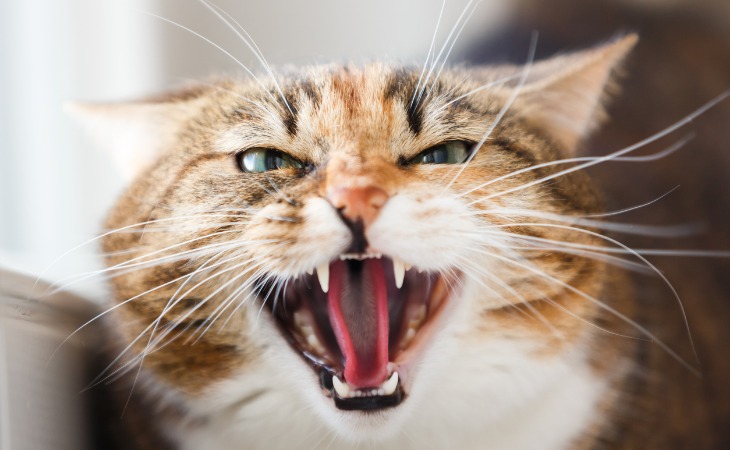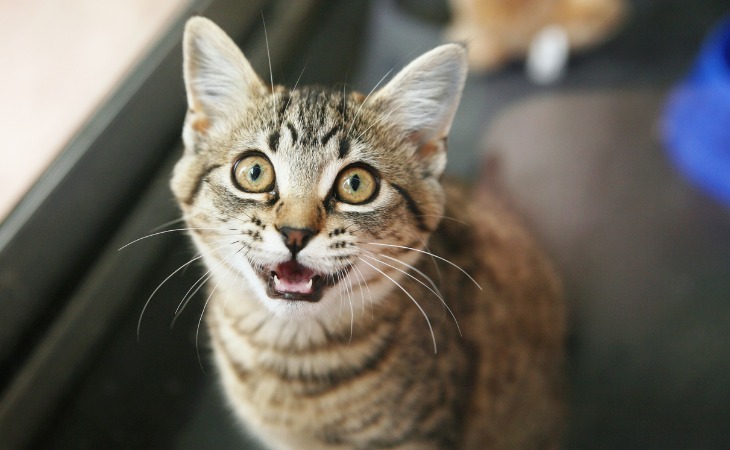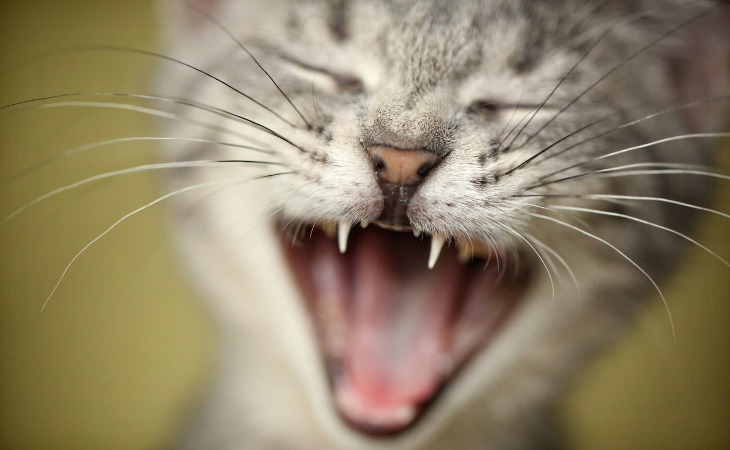Do you find yourself having a hard time getting a good night’s sleep due to meowing in the middle of the night? Nighttime meowing, although common, can be bothersome or confusing. Many of us ask ourselves these questions: “Why is my cat meowing at night?” or “What are the solutions to limit nighttime meowing?” We will see together that there are many reasons why a cat can be talkative at night.
The desire to go outside
Cats are animals with wild instincts. If yours meows at night, it may be to signal that it wants to go outside. To find out, check to see if it is standing in front of the door when it meows.
Be aware, however, that if you give in several times, it will become habitual. Your sleep may then suffer. It is recommended to make him/her independent by installing a cat door. By doing this, you are allowing your cat to go out on an adventure without disturbing your sleep.
Stress or excitement
Positive (excitement) or negative (stress or fear) emotions can explain why a cat might be meowing at night. To express its emotion, your cat may emit cries followed by purring.
In addition, a change of furniture or a strange environment can promote stress and anxiety in cats. As they are routine animals, domestic felines are sensitive to the slightest change in their habitat. Therefore, be mindful of the context of your cat’s night-time meowing to understand what it is expressing.

Hormones
In many breeds, cats are sexually mature by the age of six months and experience their first heat. After sexual maturity, a hormonal peak occurs periodically in their body. This hormonal discharge manifests itself by unusual behavior even in those who are generally calm. Your female cat will rub her head against objects, roll on the floor, meow, purr, or whistle. The meowing at night can be so intense that it’s similar to a baby’s crying.
Male cats are not exempt. By wanting to express their sexual availability in heat periods, the cats in the neighborhood will release pheromones. Attracted by these very strong olfactory signals, male suitors also communicate their desire by meowing. In front of a closed door at night, your male cat can therefore purr and meow strongly to indicate that he wants to join a nearby cat in heat.
Hunger or thirst
Hunger is another common cause for meowing at night. Unlike humans, domestic felines are used to nibbling small portions at regular intervals. As they are active at night, they expend energy, and their stomachs empty very quickly. Your furry companion will then start to meow heavily, often next to his/her bowl. If the noise is emitted next to a sink or water source in the house, understand that he is thirsty.
Loneliness and the need for cuddles
Cats are social animals. Most breeds love human contact, affection, and the tenderness of their owners. However, they find themselves alone at night while their exhausted owners sleep. If bored, your cat can then seek out companionship to have fun. With a kitten brimming with energy, the meows can be deafening.
If your cat’s meowing is accompanied by purring at night, your cat may wish to be petted. Having spent the whole day resting, it might want to benefit from your cuddles.
The urge to relieve oneself
Your cat may meow all the time because it wants to go to the litter box to relieve himself/herself. When the need is urgent, the meowing can become long and insistent. Make sure your cat has access to the litter box at all times.
A sign of illness
In general, cats tend to suffer in silence and hide their suffering for a long time. However, when the pain is coupled with the absence of their owner, they have no choice but to meow intensely. This agitation may be due to joint pain, high blood pressure, or heart disease.
A depressive state is also a form of pain that the cat can express in various ways. For example, if it is usually very communicative and vocal, but begins by meowing weakly, this is suspicious.
Age-related difficulties such as the loss of certain senses (deafness or blindness) can also frighten your cat. It might express this fright by more meowing at night.
Expression of joy or anger
Some meowing can be indicative of feelings of joy or anger. If you’re available at night to cuddle it, it might meow gently to show its joy or well-being.
On the contrary, a meow with a hoarse tone could be the manifestation of anger that can have several origins. This is the sound you’ll hear when cats come face to face. It is often accompanied by growling or puffing. If they are fighting, the agitation is characterized in both parties by meowing followed by howling.

Other reasons why a cat might meow at night
Apart from the above reasons, there are many other reasons for cats to meow at night. Cats also have their own peculiarities that are specific to each individual or breed. Thus, some breeds are more talkative than others. If your kitty is a Siamese or an Asian breed (Balinese, Burmese, Tongan, etc.), it will meow a lot on a daily basis. You will therefore have to get used to an expressive and talkative cat even at night without worrying.
The night-time meowing of a domestic feline is sometimes also linked to the upbringing you have given it. For example, when you open the door to your cat at every meowing, you reinforce this behavior. It will interpret your reaction as a reward. Meowing will then be a habit and it will do it every time in front of your door, even in the absence of a real and urgent need.
A few tips to prevent night-time meowing
The solutions and tips to prevent nighttime cat mewing are as varied as its causes. Here are a series of tips specific to different meowing patterns.
When the meowing is due to hormonal reasons, the best alternative is to have your cat neutered by a veterinarian.
If you suspect that the meowing is related to an illness or pain, do not hesitate to take your cat to a specialist. It will be taken care of with appropriate care.
Meowing due to loneliness, stress or anxiety is an indication of a lack of affection. During the day or sometimes in the evening, play with your cat and pet him/her. Give him/her love. Your cat will feel appreciated and will disturb you less often at night. You can also set up cat intelligence games for your cat before going to bed.
When the cat is meowing to relieve himself/herself, allow the cat access to the outdoors or to the litter box at all times. Make sure that the litter box is clean.
If your cat meows at night because it is hungry, you can feed him/her before going to bed. Then, provide a second portion of food for the night. You can also invest in an automatic kibble dispenser and a water fountain.
When your cat’s basic and urgent needs are met, avoid responding to his/her meowing. This will only encourage your cat to continue to meow at night.
If your cat meows at night, you now know more about the different reasons for this. By using the various tips provided, you can reduce the meowing at night so you can enjoy your sleep better.

